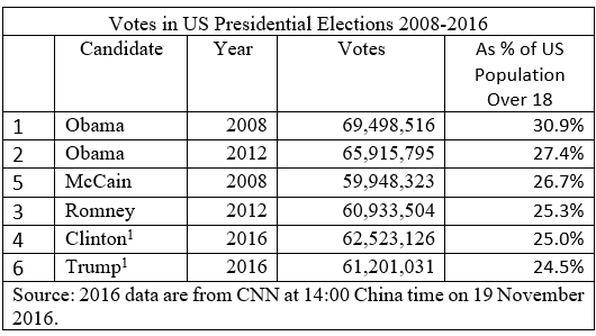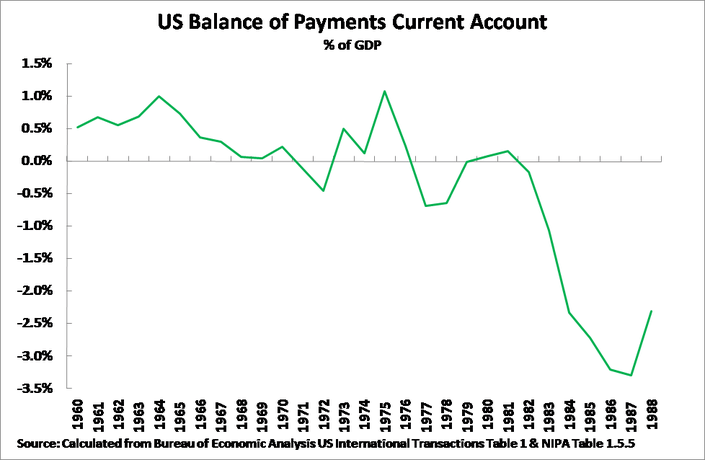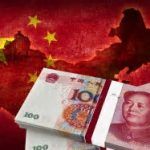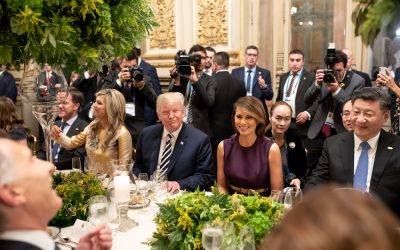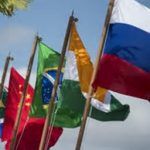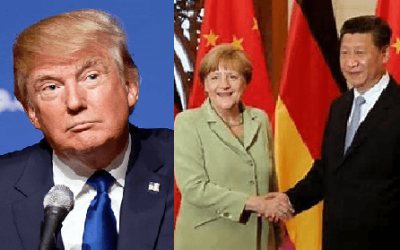On 30 July Trump unleashed a Twitter storm against China. His 1st tweet was against China on the economy: ‘I am very disappointed in China. Our foolish past leaders have allowed them to make hundreds of billions of dollars a year in trade, yet…’ The 2nd one was an attack on China over North Korea: ‘…they do NOTHING for us with North Korea, just talk. We will no longer allow this to continue. China could easily solve this problem!’
It is important to understand that these attacks have nothing to do with the real situation. It is lack of competitiveness of the US economy that creates its jobs problems, and China does not control North Korea, China’s position being for denuclearisation of the Korean peninsular – as every serious expert on Korea knows, and as these analysts even in the US are clear.
The reality is that Trump brought into the core of his administration from day one neo-con anti-China forces who were merely muzzled for a period for purely tactical reasons. The policies of these neo-cons are against the interests and living standards of the US people – as analysed in ‘Why “China-Bashing” is a Disaster for the US People’ and ’The Damaging Blind Alley of US Protectionism’. Now, possibly to distract attention from his recent domestic failures, Trump has decided to encourage the neo-con forces who were brought into the core of his administration.
This article, already written in November 2016 immediately after Trump’s election as President, analyses the neo-con forces brought into the core of the Trump administration and whose significance is confirmed by recent events.
- Trump has brought extreme anti-China forces into his administration.
- Trump has marginalised neo-liberal economic forces in the US.
First the facts regarding the social forces around Trump will be established and then the consequences for China analysed.
Trump is based on the non-democratic features of the US political system. In ‘Trump is Not a Victory of American Democracy’ it was demonstrated that the voting trends in the US presidential election showed:
- Trump did not represent a ‘popular wave’, he had less popular support than any other presidential candidate in recent US political history – receiving 24.5% of the vote of the US population of voting age compared to 25.3% for the Republican candidate Romney in 2012, and 26.7% for Republican candidate McCain in 2008. Further results announced since ‘Trump is Not a Victory of American Democracy’ have confirmed the analysis of trends in that article – the data is updated in Table 1 below.
- Clinton received more votes than Trump – over 1,300,000 at the time of writing and with Clinton’s eventual lead against Trump being estimated by the New York Times to be around two million. Trump therefore did not represent a ‘triumph for democracy’ – he represented the victory of a non-democratic political system over democracy, as Trump became president despite receiving fewer votes than the other main candidate.
- It is notable that non-democratic trends in the US system have increased – in two of the last five presidential elections the candidate who received less votes became president (George W Bush received less votes than Gore in 2000, Trump received less votes than Clinton in 2016).
- The election did not represent a revolt against ‘political correctness’ – because the candidate identified with ‘political correctness’ (Democrat/Clinton) won more votes than the ‘anti-political correctness’ candidate (Republican/Trump) as they have done in six out of the seven US presidential elections since 1988.
- The failure of Democratic electors to vote for Clinton was due to deep economic discontent, but despite this Clinton received more votes than Trump
In summary, the facts demonstrate that Trump represents a consolidation of authoritarian and non-democratic forces in US politics. That such non-democratic trends in US politics have strengthened is confirmed by the fact that two out of the three last Republican presidential terms were gained by Republicans who received less votes than Democrats – Bush in 2000, Trump in 2016.
Such ‘authoritarian’ trends, that is the coming to office of presidents against the trend of popular support, previously had allowed adventurist policies to be pursued by US presidents which were ultimately damaging for global stability. The most disastrous case of this was George W Bush’s decision to invade Iraq in 2003 – a policy that would almost certainly not have been pursued by Gore, who received more votes than Bush in 2000. Bush’s policy both destabilised the Middle East and resulted in enormous losses to the US economy – estimates of the final cost of the Iraq invasion are above $1 trillion.
The existence of a president who was not supported by the US public opinion/voting was shown in the case of George W Bush to lead to reckless and adventurist policies. It remains to be seen if this will also occur with Trump – although the objective risk is clearly demonstrated by Bush.
Seek truth from facts
In this article further errors in analysis in some sections of the media will be analysed. However, before dealing with individual issues it should be noted that a fundamental reason for these mistakes is that not only Chinese liberals but also some people in China who considers themselves ‘anti-Western’ in reality take Western type ‘democracy’ much too seriously – by believing that what is said in election campaigns is meant to be implemented. Much of what is said in election campaigns is merely intended to fool people and conceal the truth. There is therefore no point in paying a great deal of attention to what Trump said, what matters is the facts of the social forces shown in the election and what actual actions are taken by Trump. In the correct Western dictum ‘actions speak louder than words’ or in the Chinese idiom ‘seek truth from facts’.
The fundamental issue is that it must always be remembered that fundamental decisions in the West are taken by money and power not by votes – votes can of course be allowed to decide a few minor matters. Once that fundamental rule is applied then what Trump represents, and what he will do, becomes clear. Chinese readers can then easily verify these facts against unfolding events.
The real social forces aligned around Trump will now be analysed.
Trump is a 100% representative of US capital not an ‘outsider’
An erroneous claim which appeared in some parts of the media is that Trump is an ‘outsider’. That is certainly how he wanted to present himself to the US electorate. Trump correctly judged the US population at present has contempt for its economic and political ‘elite’. Trump therefore did have different political tactics from the majority of the US capitalist class, as his aim was deliberately to present himself as ‘outside’ the US political establishment. But the claim a billionaire is an ‘outsider’ is evidently actually ridiculous. Trump is not merely a representative of big US capital he is a personally a large capitalist. Trump’s aim is therefore to safeguard the interests of big US capital, as is fully confirmed by the transition team he has appointed. As the US website The Intercept analysed this difference between appearance and reality entirely clearly and in detail it is merely necessary to quote its data:
‘As Donald Trump finishes his campaign with a promise to break the control of Washington by political insiders, his transition team is preparing to hand his administration over to a cozy clique of corporate lobbyists and Republican power brokers.
‘“Our movement is about replacing a failed and corrupt political establishment with a new government controlled by you the American people,” Trump says in his closing campaign advertisement, followed by flashing images of K Street, Wall Street, and Goldman Sachs Chief Executive Lloyd Blankfein.
‘But the Trump transition team is a who’s who of influence peddlers, including: energy adviser Michael Catanzaro, a lobbyist for Koch Industries and the Walt Disney Company; adviser Eric Ueland, a Senate Republican staffer who previously lobbied for Goldman Sachs; and Transition General Counsel William Palatucci, an attorney in New Jersey whose lobbying firm represents Aetna and Verizon. Rick Holt, Christine Ciccone, Rich Bagger, and Mike Ferguson are among the other corporate lobbyists helping to manage the transition effort.
‘Presidential transition teams develop policy plans and come up with a list of more than 4,000 people an incoming president appoints, including White House jobs, cabinet secretaries, and lower level positions that oversee the military, agriculture, trade, and beyond.
‘Trump for America Inc., a nonprofit group chaired by Gov. Chris Christie, R-N.J., to oversee the Trump transition, has quietly moved ahead, meeting with interest groups and reaching out to lobbyists to plan a future Trump administration.
‘The group has held regular meetings at the Washington, D.C., offices of Baker Hostetler, a law and lobbying firm.
‘On Thursday, the group hosted a breakfast at Baker Hostetler attended by Microsoft’s Ed Ingle and Steve Hart, two lobbyists who, according to filings, have worked to promote the Trans-Pacific Partnership. Other transition meetings have included briefings with the Financial Services Roundtable and the Investment Company Institute, two lobby groups that represent Wall Street interests, as well as with the BGR Group, a lobby firm that represents Saudi Arabia and the South Korean government…
‘Trump’s decision to embrace lobbyists while denouncing them on the campaign trail should come as no surprise to any seasoned observer.
‘The reality television mogul seized on distaste for big money politics as a potent campaign issue, denouncing the role of Super PACs during the Republican primaries. “I have disavowed all Super PACs,” Trump said, adding that he would oppose any support from lobbyists and other special interest groups. After shoring up the nomination, the candidate quickly reversed himself, not only raising cash from lobbyists but switching gears to aggressively embrace the same Super PAC strategies used by more traditional candidates. Several Trump staffers moved from his campaign to Super PACs supporting the Trump-Pence ticket.’
Martin Wolf, chief economics commentator of the Financial Times, equally outlined in quantified terms how Trump’s tax policies would benefit rich layers in the US:
‘The tax proposals would shower huge benefits on already rich Americans such as Mr Trump. According to the Tax Policy Center, his latest plan would raise the after-tax income of those in the middle fifth of the income distribution by $1,010 or 1.8 per cent. But the top 0.1 of the population would enjoy an average tax cut of nearly $1.1m, or more than 14 per cent of after-tax income. The cumulative increase in federal debt might be as much as 25 per cent of gross domestic product by 2026. Congressional Republicans might wish to offset the latter, at least partially, by slashing spending, including on social security and health.’
Trump economic policy – the end of neo-liberalism
One area in which there have been genuine economic differences between Republican and Democratic administrations, and where Trump genuinely has a difference to Obama, is regarding the much greater willingness of Republican administrations to run large budget deficits. This is already prefigured by trends in financial markets. As analysed at length in my book The Great Chess Game (一盘大棋?中国新命运解析) the previous Republican administrations of Reagan and George W Bush merely spoke in words about ‘small government’ and ‘fiscal prudence’. In reality they practiced massive state spending on the military, ran huge budget deficits, and financed these extremely large state borrowing. They simultaneously stimulated household borrowing. This accumulation of debt in turn culminated in the financial collapse of 2008.
Since the election, Trump’s team has indicated the same path as these big spending Republican administrations. That is Trump’s administration has indicated its break with ‘neo-liberal’ ideas. Steve Bannon, the Trump administration’s newly appointed Chief Strategist, stated in his first major interview after appointment: ‘we’re going to build an entirely new political movement…. The conservatives are going to go crazy. I’m the guy pushing a trillion-dollar infrastructure plan. With negative interest rates throughout the world, it’s the greatest opportunity to rebuild everything. Ship yards, iron works, get them all jacked up. We’re just goin
g to throw it up against the wall and see if it sticks.’ Such policies clearly have nothing to do with ‘neo-liberalism’.
The administration stated will carry out a $1 trillion stimulus programme. This will consist of both tax cuts and state spending increases. In a policy again showing Trump to be a direct representative of US big capital, Trump has stated US corporation tax on big companies will be reduced from 35% to 15%. Trump’s team has also particularly emphasised support for large scale infrastructure spending. This combination would require an increase in the budget deficit and larger scale state borrowing. Financial markets have confirmed that they believes such a return to previous Reagan/George W Bush policies by a substantial increase in interest rates – indicating greater demand for borrowing. The interest rate on US 10 year Treasury bonds rose extremely rapidly from 1.83% on 7 November, the day before the election, to 2.22% on 11 November – showing that bond markets were expecting extremely heavy US state borrowing.
One of the ironies of Trump’s policies is therefore that it leaves China’s ‘neo-liberals’ looking ridiculous – as neo-liberal policies are being disowned in favour of state spending even in the US! As Martin Kettle of The Guardian noted of Trump: ‘What stands out is that he is an anti-liberal.’ More precisely Kettle noted: ‘In his own… way, Trump stands for something true. He stands for the recognition that the global liberal order has not worked well, that intervention by the state is the only means of correcting and revising it and that socially liberal US regimes have fallen short.’
But despite Trump’s clear economic orientation whether this can actually be implemented in practice is a different issue. Reagan’s policies produced a sharp worsening of the competitiveness of the US economy as shown in its rapidly worsening balance of payments deficit. As shown in Figure 1, prior to Reagan winning the presidency in 1980 the US balance of payments, the key indicator of the US economy’s competitiveness, had remained essentially in balance despite the negative impact of the international oil price rise in 1973 – the largest US balance of payments deficit was 0.7% of GDP in 1977. In contrast, following Reagan’s election the US balance of payments deteriorated sharply – i.e. the US economy suffered from rapidly declining international competitiveness. By 1987, Reagan’s penultimate year in office, the US balance of payments deficit reached 3.3% of GDP – showing unprecedented post-World War II worsening US competitiveness.
But the deficit on the US balance of payments simply also shows the amount of foreign financing – by economic definition the inflow of foreign capital is exactly equal to the balance of payments deficit with the sign reversed. Reagan’s policies were in fact financed by massive foreign borrowing – at that time primarily financed by Japan. In present circumstances following the international financial crisis, however, it is uncertain that other countries have the resources for similar large scale lending to support Trump’s policies. However, while considerable practical obstacles exist to practical implementation of the large-scale stimulus programmes envisaged by the Trump administration its break with neo-liberal concepts is clear.
Trump is not an isolationist
Another misunderstanding is that Trump is an ‘isolationist’ who will therefore reduce US military involvements and interventions overseas. Once again Trump did understand that genuine ‘isolationism’, the view that the US should withdraw from foreign adventures, does have major support among the US people. A big section of the US population rightly believes that as the US is protected on one side by the Atlantic Ocean, and on the other by the Pacific, it is therefore impregnable to conventional attack. Simultaneously the US’s powerful nuclear forces mean no country would launch a nuclear attack on it. Therefore, the concept of very wide layers of the US population is that, as the US is fully protected, it should withdraw from disastrous military adventures such as the Vietnam war, invasion of Iraq, or large scale interventions in the Middle East or East Asia and adopt a strictly defensive military policy focussed on safeguarding its own territory.
But US big capital is not in the slightest isolationist. It wishes to safeguard its hegemonic international position. The only problem it saw with events such as the invasion of Iraq was that they were unsuccessful. The US has no intention of withdrawing from reliance on its military forces. Trump has fully confirmed policies in line with such positions by a pledge to significantly increase the strength of US military forces and US military spending. An ‘isolationist’ foreign policy does not require the big military build-up Trump has pledged! The pledge to seriously increase US military spending shows clearly Trump is not pursuing an ‘isolationist’ policy. Far from seeking ‘isolation’ one of the very first acts of Trump after being elected was to speak and meet with Japan’s Abe, a determined enemy of China, and to speak by phone with South Korean President Park.
The TPP
There is no doubt one of Trump’s most popular pledges in the election to was to oppose the TPP and its Atlantic equivalent the TTIP. It is a striking testimony to the unpopularity of the TPP that every popular candidate in the primaries – Trump, Clinton and Sanders – pledged to oppose it. The fact even Clinton, who probably actually supported the TPP, was forced to say she was against it showed that support for the TPP was considered suicide with the US electorate.
The problem for Trump is that the majority of US big capital wants a deal like the TPP. Previous US presidents had opposed trade agreements while campaigning for the post and then implemented them in office. Clinton severely criticised NAFTA while a candidate and then helped secure Congressional endorsement for it as president. Obama spoke against the US free trade agreement with South Korea when a candidate and then approved it as president. Trump, however, made opposition to the TPP absolutely central to his campaign. Possibly Trump will therefore conclude that anger over his reneging on a pledge to oppose the TPP would be so unpopular it cannot be done. [Trump cancelled the TPP – JR 30/07/17] But that merely means that he will try to secure the same anti-China results as the TPP through some other means.
Certainly, such a goal for Trump is easier to decide upon than to achieve. It took tremendous efforts to get the agreement on the TPP. Abe was desperate for the TPP to be adopted – Japan’s parliament ratifying it even after Trump’s election. Difficulties in the TPP create the opportunity for China to promote a genuine agreement in the Pacific which expands trade rather than the protectionism of the TPP. But nevertheless there should be no illusion. While Trump may abandon the form of the TPP he will in reality attempt to secure the passing of anti-China economic policies which parallel the TPP.
Trump is bringing hard line anti-China forces into his administration
Turning to Trump’s direct policies towards China one positive development is that Trump has shown no interest in the fake US campaigns about ‘human rights’ directed against China. Furthermore, given his own stated positions – support for torture, for expulsion of 20 million immigrants from the US, for banning Muslims from visiting the US etc. – a ‘human rights’ campaign by Trump would carry little or no credibility. Therefore, hypocritical US campaigns on ‘human rights’ may be expected to sharply decline or even disappear.
However, because Trump is a representative of US big capital, he is immediately bringing into his administration forces, such as those analysed above, which supported military adventures such as the invasion of Iraq. Trump is specifically bringing hard-line anti-China figures into his team. As the Financial Times noted: ‘Advisers to Mr Trump include Alexander Gray, who formerly worked for Republican Congressman Randy Forbes — an outspoken critic of China’s government; [and] Mike Pillsbury, author of The Hundred Year Marathon, which argues that China is gearing up for world domination.’
In particular, the person Trump has endorsed as ‘right on’ about China is Peter Navarro. Navarro sees war with China as ‘very likely’ and claims that ‘Bill Clinton sold America down the Shanghai River’. He is producer of a YouTube programme ‘Death by China’. Navarro has written three virulently anti-China books in the last eight years Crouching Tiger – What China’s Militarism Means for the World, Death by China – Confronting the Dragon, A Global Call to Action and The Coming China Wars: Where They Will be Fought and How They Can be Won. Navarro calls on the US to fight China by being tough on trade and taxing China’s exports.
Possibly some of Trump’s most extreme anti-China pledges in the campaign, such as a 45% tariff on Chinese imports to the US or to immediately designate China as a currency manipulator, will not be put into practice, as they could damage the US itself. Nevertheless there is no doubt that the core of Trump’s team for dealing with China on trade, as on geopolitics, is made up of hard line anti-China forces. As the New York Times noted:
‘In a strong signal, Mr. Trump has turned to Dan DiMicco, a longtime steel executive and trade critic, to oversee trade issues during his administration’s transition. Mr. DiMicco writes a personal blog, liberally sprinkled with exclamation points, that blames America’s industrial decline on cheating by trade partners, particularly China.
‘“Hillary Clinton has claimed Trump’s trade policies will start a ‘Trade War’ but what she fails to recognize is we are already in one,” he wrote on his blog last summer. “Trump clearly sees it and he will work to put an end to China’s ‘Mercantilist Trade War’! A war it has been waging against us for nearly 2 decades!”’
Claims, such as those in New York Times, by one China analyst regarding Trump, are therefore inaccurate: ‘He has shown no desire to tell other countries how to do things… Mr. Trump is
a resolute businessman with little ideological underpinning. Without the shackles of ideology, even the most competitive rivals can make deals. This is a new day for the world’s most consequential bilateral relationship.’ On the contrary, as shown above, Trump is surrounding himself with bitterly anti-China forces.
This does not mean that resolutely anti-China actions by Trump are inevitable. China’s rightly has no desire for any unnecessary clash with the US and on the contrary seeks a ‘new type of great power relations’ with it. If China’s strength is great Trump may not seek to directly confront China – as that would damage the US itself. But given the forces Trump is surrounding himself with in his administration this will not be out of any ‘kindness’ of Trump but merely because of China’s strength. It is therefore only on China’s strength, not any positive features of Trump, that China must rely on. This is line with the fundamental features of China-US relations analysed in greater historical depth in ‘Why a US-China ‘Thucydides Trap’ Can Be Avoided’.
Alignment of international forces
Naturally China is proceeding objectively in its approach to the Trump administration, seeking cooperation and not confrontation – a wise foundation of China’s foreign policy. Nevertheless it is also necessary to base policies on facts, and not on mere hopes.
These facts show that Trump is a determined representative of US capital, who came to office based on non-democratic features of the US political system, and who has brought strongly anti-China forces into his administration. Trump will therefore only not adopt a confrontationist position to China if China is strong.
However, Trump is also in collision with many forces both in the world and inside the US. China for its own national interests will have to defend itself relying primarily on its own strength. But that international situation also necessarily means China will have to consider the position of other forces internationally – in the famous formula of Chairman Mao China has to analysed on the international terrain ‘who are friends and who are enemies?’
The crucial question to judge other forces is not their present subjective view of China but their objective position on the key issues. For example, the hostility of the US population to the TPP has created significant difficulties for one of the most important economic attacks on China. This is even although many people opposing the TPP in the US do not yet have a favourable attitude to China – nevertheless they objectively helped China. There will be an expanding series of issues like this. While it is not possible to foresee all of these several key trends can already be identified.
China is main force in the world economy now standing clearly in support of globalisation – with Trump having made a US turn at least in rhetoric to protectionism. I have analysed this in ‘China has Become the Most Important Pillar of Globalisation’ (特朗普胜选将令中国成为全球化的最重要支柱). As the world’s other rapidly growing economies are also oriented to high and growing levels of trade in their economies this gives to China the possibility to place itself at the centre of world forces in favour of open trade and globalisation.
The majority of the world’s countries are clearly against climate change – an issue on which the approach of Trump so far has been extremely negative. Therefore, as Reuters noted under the self-explanatory headline ‘Trump win opens way for China to take climate leadership role’:
‘The election of climate change skeptic Donald Trump as president is likely to end the U.S. leadership role in the international fight against global warming and may lead to the emergence of a new… champion: China.
‘China worked closely with the administration of outgoing President Barack Obama to build momentum ahead of the 2015 Paris Agreement on climate change. The partnership of the two biggest greenhouse gas emitters helped get nearly 200 countries to support the pact at the historic meet in France’s capital.
‘By contrast, Trump has called global warming a hoax created by China to give it an economic advantage and said he plans to remove the United States from the historic climate agreement, as well as reverse many of Obama’s measures to combat climate change.’
Climate change is regarded by wide circles internationally as a key issue. Their opposition to the likely policies of Trump on this will bring them into objective alignment with the positions on China on this question.
More generally polls show the majority of public opinion in the West is also strongly against Trump. The tone of a single example from Andrew Rawnsley, the political analyst of The Observer, summed up some widely expressed views:
‘A serial bankrupt will be at the wheel of the world’s largest economy. A man with no experience of elected office will preside over a government machine with 2.8 million civilian employees and 1.5 million military personnel. A man who will be pursued into the White House by a pack of lawsuits will be in charge of the FBI. A man repeatedly described as unfit for the office by senior members of his own party will be the commander-in-chief with his finger on the trigger of more than 4,000 nuclear warheads. A man who knows little about the rest of the world will become the most powerful person on the planet. Two-thirds of Americans told pollsters that he lacks the temperament to be president, but he is going to be put in the high seat anyway.’
China rightly pursues a policy of non-intervention in the internal affairs of other countries. It will therefore certainly not become involved in domestic political issues in the West. However, the objective consequences of Trump’s victory can be noted. ‘Liberal’ opinion in the West previously had often had wrong positions on China under the influence of anti-China propaganda from the US neo-con and other forces. The same circles affected by such propaganda had wrongly adopted the view that the US was the leader of ‘liberal values’. The election of Trump will lessen such illusions in the West, and on key issues such as globalisation, climate change and others such forces will adopt positions paralleling those of China. While China will undoubtedly maintain its position of non-interference in domestic political issues in other countries nevertheless a certain recomposition of Western political positions will take place.
Conclusion
In summary, China’s positions on foreign policy are well known, deeply held and clearly will not change. China has rightly stated it seeks the most friendly and cooperative relations with the US, rejects interference in the internal affairs of other countries, and judges countries and politicians above all by their actions and not merely by words. But nevertheless such a major event as Trump becoming US president will necessarily have an effect on discussion in both China and internationally:
- In China, the position of neo-liberal opinion will be shown to be even more ridiculous as with Trump even the US has abandoned ‘neo-liberal’ positions.
- A larger part of international public opinion will be aligned with China on key issues such as globalisation and climate change – creating openings for China to achieve an objective understanding of its policies internationally.
Further clarification of trends will of course depend on the actions of the Trump administration itself.




